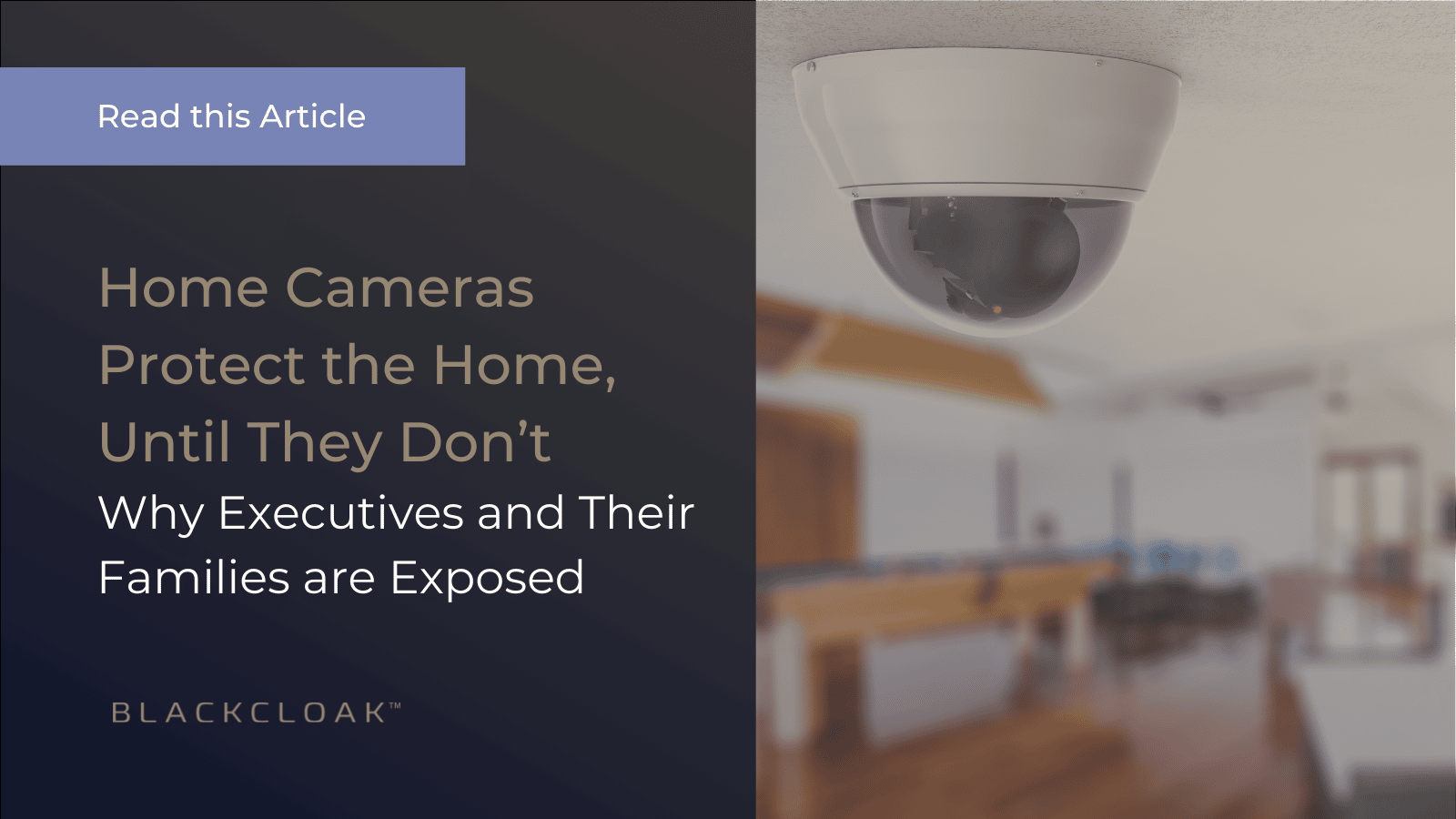Home Cameras Protect the Home, Until They Don’t. Why Executives and Their Families are Exposed

In the United States, burglary is the most feared property crime and one occurs every 30 seconds. Home camera surveillance systems have long been the go-to tool to deter and stop this form of crime before it happens. That is, until they don’t.
While home cameras provide valuable peace of mind and are a powerful deterrent, they are also full of loopholes that spying eyes can easily exploit – particularly if the residence is home to an executive.
Each day our team witnesses the destructive impacts on high-profile clients and their families when their home cameras are freely accessible on the internet. Indeed, members of the C-suite are 12 times more likely to be targeted in cyber-attacks and connected camera systems are a key risk vector that they look to exploit. BlackCloak research shows that one in five home camera systems are viewable by strangers.
Why home cameras are easy targets for hackers
Even the highest-grade security cameras aren’t necessarily safe from hacking. For convenience, these systems are often set up by the installer to be as open as possible so that any future maintenance work is friction-free. If security settings are put in place, they are often misconfigured. Experts believe that 3.5 million home security cameras across the globe are at risk of a cyberattack due to poor design and configuration issues.
It’s also outside the scope of these professionals to run regular security scans of installed systems. If devices are outdated or running out-of-date software, the chances of being breached rise significantly.
And so it goes. Any opportunistic attacker can use scanning technologies to locate the publicly facing cameras. With stolen credentials in hand (easily available on the dark web) they can then peer into the private lives of their target and gain access to the entire connected home and compromise both the family and the company.
Insecure home cameras leave executives of a financial firm exposed
It’s something we’re seeing more and more of. For instance, we worked with managing partners of a financial firm to help protect them against cybercrime in their personal lives. Both had high-end home camera systems installed by a leading provider – one inside the home and the other outside. These systems were part of a wider home automation system used by their families and kids. They hired the best audio-visual and home automation staff to make it happen. So when we stepped in and found that their home cameras were vulnerable they were shocked.
Our security review discovered that the systems were open to strangers, so anyone could watch their kids and their private moments. All past recordings were also viewable. It gets worse. Furthermore, should a bad actor get into the home automation system every device on their network was viewable.
Finding and patching vulnerabilities is hard
The worrying thing is that it’s almost impossible to know if your security camera has been hacked – or even what to do about it.
Common techniques used to secure home cameras include changing default passwords, using encryption, unique passwords and dual factor authentication logins, frequent software updates, and more. That’s great, but it’s a lot to stay on top of – especially for higher end systems – plus it does nothing to address wider security holes that permeate today’s smart homes.
A new approach is needed
Both executives needed a concierge, holistic approach to securing both their camera systems and their homes. That’s where we stepped in.
Because each smart home system is unique, we met with the managing partners to learn more about their situation and recommend and implement a plan to stop any future attacks.
Our approach included examining the home automation and camera systems for weaknesses and vulnerabilities, and partnering with the original professional installers to remediate the risks identified. We also secured all areas of their digital lives, protecting home devices in a frictionless way that didn’t interfere with their digital experience or privacy.
Knowing that other executives in the firm were also likely exposed in their personal digital lives, we extended the cloak of protection to mitigate any broader risk to the firm as well as their families.
For instance, given their unique risk profiles as financial firm leaders, they opted to deploy deception technology. Think of it as a digital honeypot that distracts a bad actor from the real information they’re after. The feature proactively alerts the executive and BlackCloak when a hacker targets and scans their devices. Now the team can stay one step ahead of cyber threats.
To quote one of the executives:
“As a CEO, I know I am a target for hacking and other attacks. I am always worried about the internet safety of my children and this one hit too close to home. Could hackers find out who we are, who my children were, watch our network, or even monitor financial information about my company? These are the types of risks that companies and corporate executives cannot directly combat, unless they have a trusted concierge cybersecurity partner like BlackCloak backing them up.”









